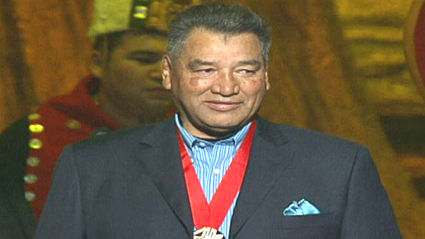Jim Sinclair, towering figure in Aboriginal history, dies at 79
Last updated 1/19/2013 at 2:38pm

cbc.ca
The role that Jim Sinclair played on behalf of First Nations and Métis peoples is unlike any other in our time.
REGINA, SK—Jim Sinclair, one of the most significant figures in the advancement of Aboriginal interests in Canada, died November 9, 2012, at the age of 79. Sinclair was a founding member of the Native Council of Canada, now known as the Congress of Aboriginal Peoples, and the Métis National Council.
In 1982, Sinclair led the effort, which wound up in the courts, to have Métis recognized in the Constitution.
“He was a leader like none we’ve ever seen before,” Don Ross, a long-time friend of Sinclair, told CBC News. “And chances are we’ll never see another one like him. He had a commitment to our community and he took it to the national level and international level.”
Sinclair’s dedication to First Nations and Métis rights was also pursued on the world stage, Ross noted.
“His role on the international scene, having an audience with the Pope, talking to the Queen and negotiating Treaty rights and just rights overall, human rights, for First Nations and Métis people, that is unparalleled in our time,” Ross said.
Sinclair’s accomplishments included playing key roles in the creation of many institutions, now well-established in Saskatchewan, including:
• The Gabriel Dumont Institute, an advanced training and trades school.
• The Saskatchewan Native Economic Development Corporation.
• The Saskatchewan Native Addictions Centre.
• The Urban Native Housing Corporations and Provincial Métis Housing Corporation.
The Federation of Saskatchewan Indian Nations recently honoured Sinclair, making note of some 50 years of work on behalf of the community.
Sinclair was born in Punnichy, north of Regina, and according to an entry in the Encyclopedia of Saskatchewan, “grew up poor in an Aboriginal squatter community in the Qu’Appelle Valley”.
He was a fieldworker, beginning in 1964, for the Métis Society of Saskatchewan and became president of the group in 1971.
From CBC files © 2012 CBC News

